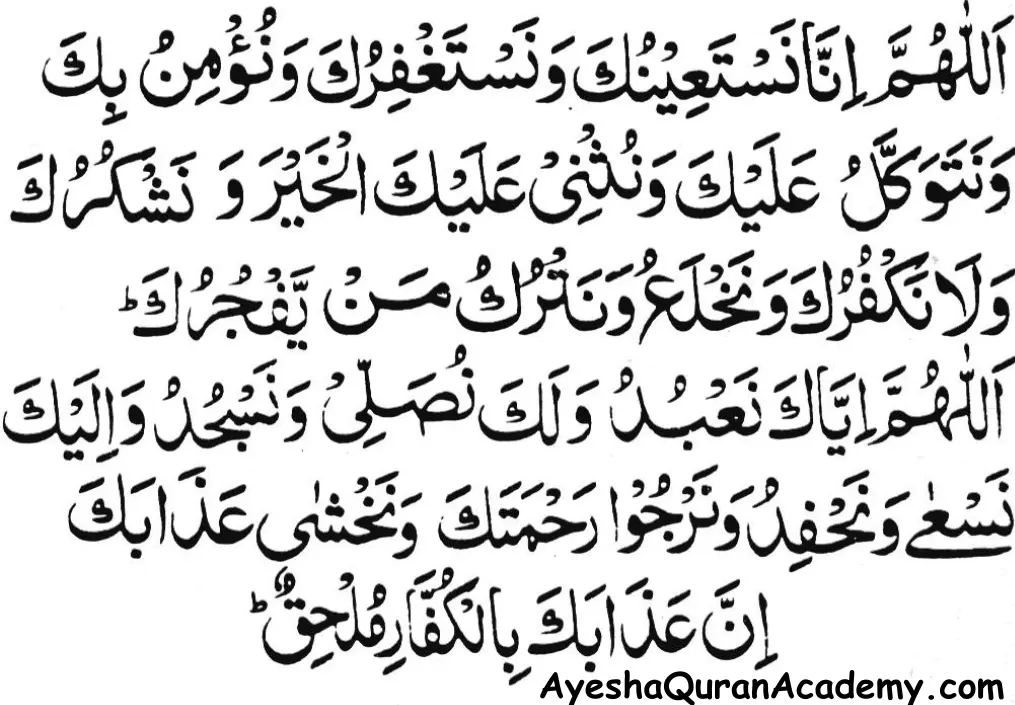Dua Qunoot, an essential and beautiful supplication in Islam, holds a special place in the hearts of Muslims around the world Dua Qunoot, which is frequently said in the second half of the Witr prayer, is a time for introspection and closeness.
The practice of Dua Qunoot english transliteration has grown in popularity, making it simpler for non-Arabic speakers to engage with this revered tradition and improving the comprehension and accessibility of this potent prayer.
Dua Qunoot Transliteration
Dua Qunoot transliteration has gained prominence as a tool for inclusivity within the Muslim community. By providing an accessible version of this supplication, it allows Muslims from diverse linguistic backgrounds to partake in its recitation, fostering a sense of unity and belonging. Here’s an example of Dua Qunoot transliteration:
اَللَّهُمَّ اِنَّا نَسۡتَعِيۡنُكَ وَنَسۡتَغْفِرُكَ وَنُؤۡمِنُ بِكَ وَنَتَوَكَّلُ عَلَيۡكَ وَنُثۡنِىۡ عَلَيۡكَ ٱلۡخَيۡرَ وَنَشۡكُرُكَ وَلَا نَكۡفُرُكَ وَنَخۡلَعُ وَنَتۡرُكُ مَنۡ يَّفۡجُرُكَ. اَللَّهُمَّ اِيَّاكَ نَعۡبُدُ وَلَكَ نُصَلِّئ وَنَسۡجُدُ وَاِلَيۡكَ نَسۡعٰى ونَحۡفِدُ ونَرۡجُوۡا رَحۡمَتَكَ وَنَخۡشٰى عَذَابَكَ اِنَّ عَذَابَكَ بِالۡكُفَّارِ مُلۡحِقٌٌ
The transliteration of Dua e Qunoot is, “Allahumma inna nast’eenuka wa nastaghfiruka Wa numinu bika wa natawakkalu ‘alaika Wa nusni ‘alaikal-khayra kullaahu Nashkuruka wa laa nakfuruka Wa nakhla’u wa natruku man-y-yafjuruka Allahumma iyyaaka na’budu Wa laka nusalli wa nasjudu Wa ilaika nas’u wa nahfidu Wa narju rahmataka wa nakhsha ‘adhaabaka Inna ‘adhaabaka bil-kuffaari mulhiq”
Oh Allah! We beseech You for assistance, we beg Your pardon, we trust You, we exalt You, we are grateful to You and are not ungrateful to You, and we forsake and detach those who disobey You. Oh Allah We only adore You, we pray to You, we bow down to You, we offer ourselves up for service in Your cause, we hope for Your mercy, and we fear Your retribution. Undoubtedly, O Allah, Your punishment will reach unbelievers!
Understanding Dua Qunoot
Dua Qunoot is a significant supplication in Islam, often recited during the Witr prayer, which is the final prayer of the night. Its profound meaning and spiritual significance make it an integral part of a Muslim’s prayer routine.
In this article, we will explore Dua Qunoot in detail, examining its purpose, significance, and the various occasions when it is recited.
The Purpose of Dua Qunoot
Dua Qunoot serves several essential purposes in a Muslim’s life:
- Seeking Allah’s Guidance: Muslims recite Dua Qunoot to seek Allah’s guidance and wisdom in times of difficulty and uncertainty. It is a humble plea for divine intervention and assistance during challenging moments.
- Seeking Allah’s Mercy: This supplication is a way of beseeching Allah’s mercy and forgiveness for oneself, the Muslim community, and all of humanity. It is a heartfelt plea for compassion and kindness from the Most Merciful.
- Protection from Harm: Dua e Qunoot is also recited to seek Allah’s protection from harm, whether it be physical, spiritual, or emotional. It acts as a shield against adversities and negative influences.
- Expression of Gratitude: In addition to seeking help and guidance, Dua Qunoot is a means of expressing gratitude to Allah for His countless blessings. Muslims acknowledge their dependence on Him and show appreciation for His boundless favors.
The Significance of Dua Qunoot
Dua e Qunoot holds great significance in Islamic tradition for several reasons:
- Spiritual Connection: Reciting Dua Qunoot strengthens the spiritual connection between the supplicant and Allah. It is a moment of deep reflection, humility, and devotion, allowing Muslims to draw closer to their Creator.
- Community Prayer: In some Islamic traditions, Dua Qunoot is recited collectively in congregational prayers, emphasizing the sense of community and unity among Muslims. It highlights the importance of communal supplication and support.
- Reflection on Quranic Verses: Dua Qunoot often includes verses from the Quran that convey messages of hope, reliance on Allah, and acknowledgment of His attributes. These verses serve as a reminder of the Quran’s guidance and wisdom.
Occasions for Reciting Dua Qunoot
Dua Qunoot can be recited in various situations, including:
- During Witr Prayer: It is a common practice to recite Dua Qunoot during the Witr prayer, which is offered after the Isha prayer. This is the most well-known and frequent occasion for its recitation.
- In Times of Crisis: Muslims may recite Dua Qunoot during times of personal crisis, such as illness, financial difficulties, or emotional turmoil. It is a way to seek solace and assistance from Allah.
- In Congregational Prayers: Some Islamic schools of thought recite Dua Qunoot collectively during certain congregational prayers, particularly during times of hardship or distress affecting the entire Muslim community.

The Importance of Transliteration
Transliteration, the process of representing words from one script into another, plays a crucial role in bridging linguistic and cultural gaps in various aspects of life, including religion.
In the context of Islamic practices, transliteration holds significant importance, especially for those who are not fluent in the Arabic language. Here, we delve into the detailed importance of transliteration, particularly in the realm of Islamic traditions and prayers like Dua Qunoot.
1. Accessibility and Inclusivity
One of the foremost reasons for the importance of transliteration in Islam is its role in making religious practices and teachings accessible to a wider audience. Arabic is the sacred language of the Quran, and many Islamic prayers and texts were originally written in Arabic.
However, not all Muslims are proficient in Arabic. Transliteration allows those who do not speak or understand Arabic to participate actively in religious rituals, fostering inclusivity and unity within the Muslim community.
2. Preserving the Spiritual Essence:
Transliteration preserves the spiritual essence and beauty of Arabic prayers and texts. When reciting Islamic supplications, like Dua Qunoot, in transliterated form, individuals can maintain the phonetic qualities, rhythm, and melody of the original Arabic text.
This ensures that the prayer retains its intended impact and reverence, even when spoken in another language.
3. Enhancing Understanding
Transliteration enables individuals to understand the meaning of the prayers they recite. While it may not capture the full depth and nuances of the Arabic language, transliteration provides a phonetic guide that allows worshippers to grasp the essential words and phrases of the prayer. This enhances comprehension and connection with the prayer’s content.
4. Promoting Correct Pronunciation
The correct pronunciation is critical when reciting religious texts, as mispronunciation can alter the meaning or impact of the words. Transliteration offers a standardized guide to the correct pronunciation of Arabic words and phrases, reducing the likelihood of errors during recitation. This is particularly important when reciting Quranic verses or supplications like Dua Qunoot.
5. Facilitating Learning and Teaching
For those learning Arabic or studying Islamic texts, transliteration serves as a valuable tool. It aids in the initial stages of learning Arabic script and pronunciation.
It is also a helpful teaching aid for educators who are introducing Islamic rituals and prayers to new learners, whether they are children or adults.
Conclusion
Dua Qunoot, a powerful supplication in Islam, serves as a means for Muslims to seek Allah’s guidance, blessings, and protection. The practice of Dua Qunoot transliteration has made this beautiful prayer accessible to a broader audience, allowing individuals from diverse linguistic backgrounds to connect with its spiritual essence.
In a world that thrives on diversity and inclusivity, Dua Qunoot transliteration serves as a reminder that we can share and appreciate the beauty of Islamic traditions with everyone, regardless of language barriers. Through transliteration, we find a way to stand united in devotion and humility, seeking Allah’s mercy and guidance together.
Related Post
- Dua Before Exams
- Dua When Breaking Fast | Best Ramadan Duas
- Are M&M’s Halal Or Haram?
- Are Chips Ahoy Halal or Haram?
- Are Twizzlers Halal?
FAQS
Afiyah is the shortest but most potent dua. Afiyah essentially means: “O Allah, shield me from all hurt and suffering.”
It aids in enhancing our vision and raising barakah in our homes, salaries, and other facets of our lives.
“O Allah, guide me with those whom You have guided, and strengthen me with those whom You have strengthened. Take me as Your close friend among those whom You have taken as Your close friends. Bless me in what You have given me. Protect me from the evil that You have decreed, for You decree in truth, and none can decree over You. One you support is never humiliated; one you oppose is never respected. Blessed are You, O our Lord and Exalted. We beseech Your forgiveness and turn to You in repentance.”


